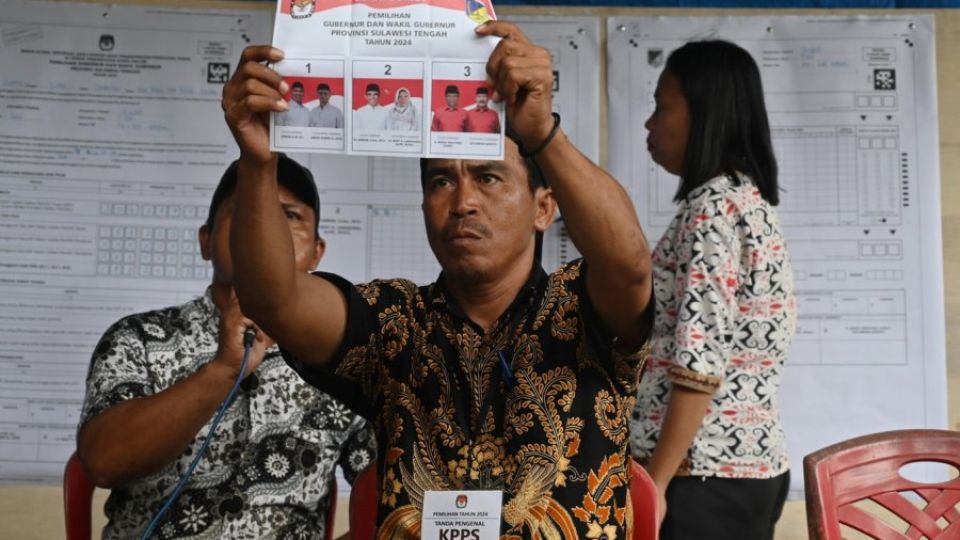December 16, 2024
JAKARTA – President Prabowo Subianto’s nod to the idea of abolishing direct regional head elections to cut costs has been met with strong criticism from pro-democracy advocates, who warn that imposing indirect polls would turn the country into a semi-authoritarian state.
Prabowo made the suggestion less than a month after the country held nationwide simultaneous regional head elections, which saw candidates backed by his Onward Indonesia Coalition (KIM) scoring victories in key battleground provinces amid historic low voter turnout.
Addressing the Golkar Party’s 60th anniversary event on Thursday evening, the President proposed that local leaders be appointed by members of local legislatures as a cost-saving measure.
“How many tens of trillions were spent from the state budget and the pockets of politicians in one or two days?” Prabowo asked during his speech.
“Our neighbors like Malaysia, Singapore and India have an efficient system. They elect local councilors who then appoint governors and regents. It’s cost-free and very efficient.”
Read also: Wider time gap needed between general and regional elections: Legislator
Funds allocated for the regional head elections should be spent on pressing needs that would better serve the public welfare, the President added, such as meals for children, school renovations and building irrigation systems.
Prabowo, who is also the leader of the Gerindra Party, criticized the reliance on foreign consultants who advocate for frequent elections.
“We don’t have to listen to them too seriously,” the President said. “This doesn’t mean that I’m xenophobic, but I’m not certain that they sincerely care about us.”
The idea of scrapping direct elections was met with support from pro-government parties, including Golkar, the second-largest party in the House of Representatives and which holds the most seats in Prabowo’s ruling coalition.
The National Awakening Party (PKB) has also lent its support to the President’s suggestion, noting that the Islamic-based party itself had repeatedly called for an improvement in the nation’s electoral system.
“It’s time for us to fix our high-cost political system,” PKB deputy chair Jazilul Fawaid said in a statement. “Apart from the fact that gubernatorial elections are expensive, regional autonomy actually exists at the level of regencies and cities.”
Public disapproval
But Prabowo’s suggestion was met with outrage from pro-democracy advocates, who warned that reverting to an indirect election system would constitute a serious setback for decades-long democratic reform.
Indonesia used to apply indirect regional head elections when former president Soeharto, who is also Prabowo’s former father-in-law, was in office. After the fall of his New Order in 1998, the country started to decentralize regional powers and introduced direct regional elections in 2005, allowing voters to directly elect the mayors, regents and governors they deemed best represented their interests.
Political researcher Firman Noor at the National Research and Innovation Agency (BRIN) urged the government to address the democratic and economic needs equally, rather than sacrificing one for the other.
“Democracy is indeed expensive, and this is the case everywhere else,” he told The Jakarta Post.
“But it’s the government’s responsibility since the country decided to adopt democracy. […] The government’s job is not to erode it, but rather to strengthen it.”
Read also: ‘Democracy is tiring, messy’: Prabowo
He pointed to the high number of votes for “blank boxes” in uncontested elections in November, which showed that orchestrations by political elites, especially by members of Prabowo’s ruling coalition, had pushed voters away from the electoral process even in the current direct electoral system. Many also blamed the big-tent coalition for sidelining popular candidates in favor of its preferred candidates.
Abolishing direct elections may turn the country into a semi-authoritarian state, Firman said, as it would “shrink the people’s role” in determining how the country is governed and turn governance into the exclusive business of political parties.
Titi Anggraini, constitutional law lecturer at the University of Indonesia, concurred, highlighting the historic low turnout in November’s polls, which reflected growing public disappointment over political parties that failed to nominate candidates who reflected public preferences. Such public disapproval may soar if the government decided to introduce indirect regional elections.
Titi also doubted that the indirect polls would help cut costs as it would not immediately eliminate the practice of vote buying or reduce the high cost of the electoral process.
“The root of the problem lies in the poor law enforcement and democratic practices within the parties, which has never really been fixed or improved,” she continued.
Cutting political costs could be achieved, Titi suggested, by reducing ceremonial costs in organizing elections and introducing tighter regulation to boost the transparency of campaign funding.


